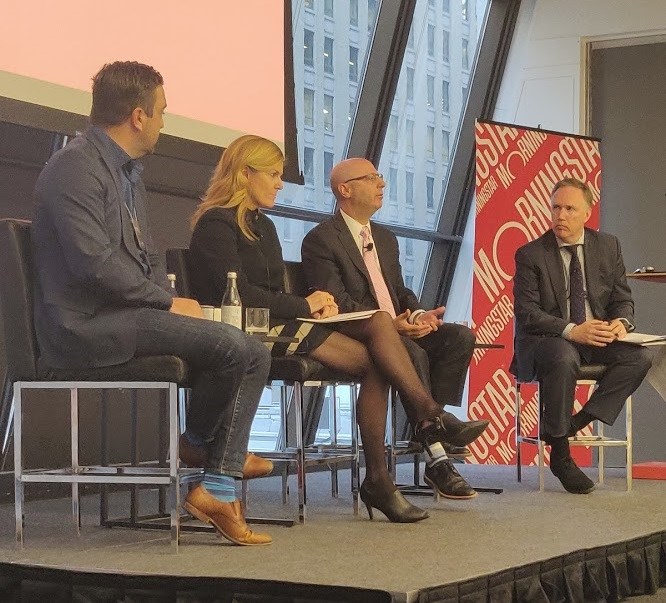
The evolution of the financial industry in Canada has picked up in pace, with technology leading the charge. However, unless the client remains front and center, any new model will be doomed to fail.
Yesterday’s Morningstar Executive Forum focused on the future of financial advice, the role of technology in building scale, and new skills and models that advisors will need to thrive.
Three panelists spoke at the forum – Irene Winel, Senior VP at IIROC, Dave Nugent, Chief Client Officer at Wealthsimple for Advisors, and Bruce Ferman, Senior VP and Managing Director at BMO Private Wealth Canada. The panel was moderated by Michael Keaveney, Director of Investment Management at Morningstar Associates.
The panel started with a discussion on the increasing commoditization of advice. Nugent pointed out that technology has helped with the automation of back-end paperwork, as well as asset allocation and aspects of investment management. The other two panelists agreed, but Ferman pointed out that people still value a personal touch, which they expect to be enhanced through electronification.
“What people value is changing. They now value comprehensive advice, high-touch, personalized advise, and ESG – though it is poorly understood,” he said.
“Technology makes things faster, easier and cheaper. This is not to say that there is no room for advice. There is room for advice, and it is crucial,” she said, adding that it is paramount that advisors put client needs first.
The panelists unanimously agreed that there is need for face to face time with clients. “One to one advice, and the human touch is hard for technology to replicate, and the clients want that – they want good advisors that take time with them,” Nugent pointed out.
So, what’s the future?
Still some catching-up to do
A recent IIROC-Accenture report found that Canadian dealers, products, platforms and investors are trailing global markets when it comes to the development and adoption of new digital advice and service offerings.
The panel agreed this is the case, with Winel suggesting that Canada is at least four years behind markets like the U.S.
“That is also because the Americans are more willing to try new things, while Canadians are more conservative,” Nugent said.
Ferman agreed that these findings are no surprise, but “we will catch up”. Part of the reason for the lag is is the high cost of technology, he said, but it’s the way forward.

Better human advice with technology
“Technology can solve everything in time,” Nugent said, adding that there aren’t insurmountable barriers to what technology can do. As an example, he explains that his firm, Wealthsimple, has automated back office processes, including anti-money laundering, compliance and risk. “Technology makes everything black and white, so it makes life easier,” he added.
Technology also helps advisors gain insights into human behaviour, which can be an opportunity for financial services firms. “What information can you glean from what people spend? What do they do? What life stages are they at? This helps us to be proactive, as opposed to reactive – if a client has a child going to college, do they still need an RESP? Does the child need a credit card? It helps us give advice when they need it,” Ferman said.
The Millennial-Dollar question
While the panel discussed the evolution of advice, questions were also raised on the evolving client demographics. Anecdotally, it does appear that more women and millennials are seeking advice – have advisors taken this opportunity into account?
“70% of women change advisors within a year of their spouses’ deaths,” said Winel.
Nugent pointed out that problems around servicing these clients satisfactorily came from inherent advisor biases, but a solution is again, technology, because technology is blind to demographics. It doesn’t matter who the client is. Technology is the great equalizer.
For more traditional firms however, the evolving nature of client demographics means that advisory teams have to change. “We need more multi-generational teams, more women advisors who can connect with the clients,” Ferman said.
Winel agreed, adding that the future of advice is understanding the clients first, and then personalizing the client’s experience.
The multi-generational planner
There is a massive opportunity here, as research has found that over the next 10 years, around $1 trillion will change hands.
“To take advantage of this opportunity, advisors will need to form multi-disciplinary teams. When you have multiple generations and multiple asset classes, you need a diverse team that can cope and connect, and also deliver the best advice,” Ferman said.
The challenge though, is to have diversity in advisors as well. “The more successful older advisors tend to be the same demographic, while the younger [more diverse] advisors might not have the same success rates,” said Nugent, emphasizing a need for more mentorship of young advisors by their established peers.
With the change in client demographics, advisors will need new skills to survive. An ability to integrate advice with new technologies is key, but there still expectations around human interactions.
Still a spot for soft skills
“Many advisors are therapists,” says Ferman.
“Empathy and openness,” says Nugent.
“Integrity,” says Winel.
Clients may be increasingly happy to use robo-advisors most of the time, but they’ll still need a human touch – it just might be delivered differently.
“Life events trigger the need for human contact – inheritance, retirement, graduation – at these times, we notice clients want video calls, or chats,” Nugent said.
Increased independence may benefit investors in their daily portfolio interactions, but they may miss big-picture cues and come knocking.
“These are ‘vulnerable investors’,” Winel says, “Oftentimes, the first person to detect the issue is the advisor,” and investors of all stripes will still need those soft skills in the future.








.jpg)











